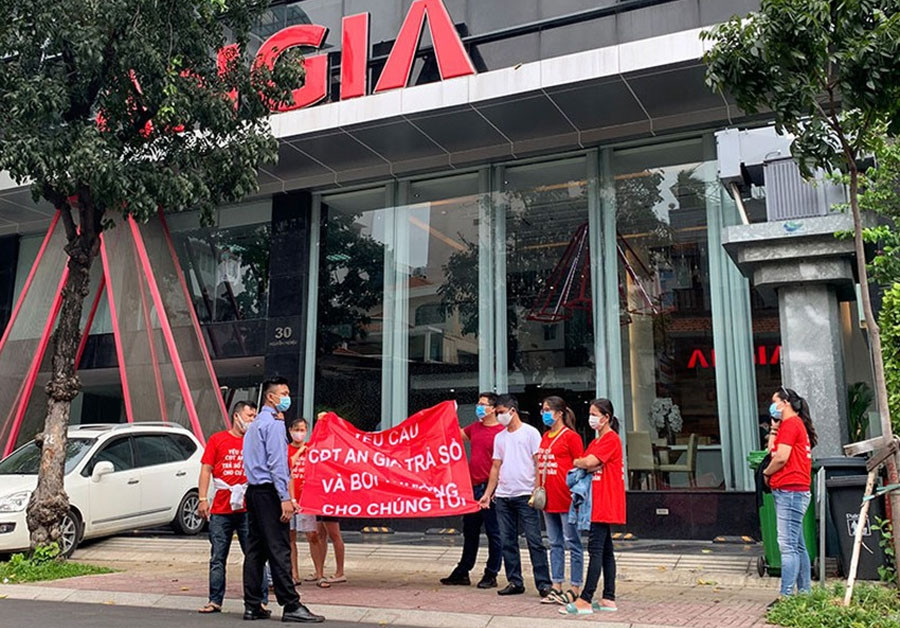What impact does credit squeeze have on real estate?
The fact that banks stop disbursing real estate loans will eliminate leveraged investors and speculative groups.
Recently, a number of banks have announced to stop lending real estate. As with Techcombank, this unit has stopped disbursing real estate loans (including not yet certified) from March 25. This bank is allowing business units to exchange and negotiate with customers to postpone the loan disbursement schedule to early April.
As for Sacombank, recently, the regional director, branch director and head of transaction office did not grant credit to the real estate sector, except for loans to officers, employees and buyers, construction and repair of real estate. residential real estate. This bank requires units to focus on providing credit to the production areas, not mobilizing – lending mortgages (real estate) at the same time.
This is just the beginning of the road to real estate credit control when only a few banks control the disbursement limit for real estate loans with certificates. The roadmap to tighten the credit valve has been considered for many years but has been repeatedly proposed to be delayed. According to experts, it is likely that the credit valve for real estate investment may be tightened from mid-2022 to stabilize the housing market.
Exchange with VnExpressMr. Huynh Phuoc Nghia, GIBC senior consultant, said that tightening real estate credit has a positive side, contributing to controlling the money supply in the market more cautiously than before. This move also cools down the housing price bubble, which has been too high in recent times. For investors who buy real estate with idle money, or businesses with good sales ability, they will be less affected when banks tighten or lock credit valves.
However, according to Mr. Nghia, tightening the real estate credit valve will definitely have a negative impact on leveraged investors and real estate speculators. Even limiting lending to real estate investment can make it difficult for investors with large inventories but slow sales.
This expert analyzed, from 2020-2021, the bank has made a move to regulate the credit valve step by step according to the review schedule. Therefore, many real estate businesses have turned to the channel of raising capital by bonds, but this capital market also has many problems that need to be rectified. For example, the issuance of detour bonds between businesses, including bank subsidiaries, also distorts capital markets. This is something that will be rectified in parallel with the credit valve tightening process in 2022, which could create a big turning point in the near future.

Real estate market in the South of Ho Chi Minh City. Image: Quynh Tran
In Mr. Nghia’s point of view, the phenomenon of real estate continuously increasing in price in recent years is being misrepresented as an advantage of the market, but in fact it is the main cause of the disadvantage of poor liquidity. This easy buy and hard sell will cause investors to be buried for a long time, if the situation lasts, it will reveal many negative things when banks tighten real estate credit valves.
For example, projects with a scale of 500-1,000 hectares have to sell tens of thousands of products to the market, which takes many years to absorb. Large inventory volume and price push up creates growth potential on paper. Customers who buy these projects are F1 investors who often pay according to the progress and are in a situation where they can’t sell cheap because they are afraid of losses, but it is difficult to find buyers when selling at high prices.
Once F2 cannot be found for sale when the payment is due, the property owner may have a need for a loan. At this step, if credit is tightened, ie unable to borrow or low loan limit will make investors unable to pay, possibly leading to a scenario of selling to get rid of backlog. “The result of inventory, high prices, lack of goods, selling cheap to get rid of goods may gradually be revealed in the near future when banks tighten credit valves,” Mr. Nghia forecast.
Having more than a decade of real estate consulting and observing the real estate market through growth and recession cycles, expert Le Quoc Kien said, currently, there are three types of real estate investment loans: Common methods: loans to buy land, loans to buy houses, loans to build houses. Either form is more or less using bank loans, so the impact of real estate credit tightening will be uneven due to different purposes of accessing capital.
According to Mr. Kien, of the three forms above, land loans have the highest speculative nature because the proportion of land plots put into end use (building houses, factories, warehouses,…) is extremely low. compared to the total amount of land purchased. Simply entering any land plot project that has been subdivided in the last 5 years will easily see the ratio of “used land” to “empty land”.
Borrowing to buy a house (both private houses and houses in the project) also has a speculative element waiting for the price to increase to make a profit, not everyone buys to live, rent, or create added value (repair, improve create, refresh). However, the speculative factor will certainly be much less than the land plot, because the house has a much higher end-use demand for living and business exploitation, through which the liquidity is also much better than the land plot.
On the other hand, those who invest in townhouses with financial potential are also much stronger than F1 people who buy land in the province that has been allocated. For example, with a capital of 1-2 billion, it is impossible to invest in townhouses, the segment that is less than 3 billion VND is difficult to invest in the suburban districts – under 5 billion, it cannot be invested in the low-income district. 2 – less than 10 billion VND is difficult to reach the central district, so they are forced to move far away to buy a small plot of land after being subdivided.
Borrowing to build and repair a house, in addition to the “end-use” needs for living, business exploitation, and rental, there are also a few investors who make a model of “buying land – building a house – selling a house”. “buy a house – repair, renovate – sell a house”. This loan demand is also a form of real estate investment, but in the direction of creating added value for the property, not just buying to wait for the price to increase.
Real estate after being renovated, repaired and built always has a very high demand and more or less makes the face of the city and the city more spacious and lively instead of the pieces of land so that it is not lifeless. cold. However, not many investors like this direction because it requires a lot of expertise (they themselves do not have enough knowledge and experience), a lot of effort to perform through many stages. Instead of buying a land of 3 billion VND and then spending another 2 billion VND to build a house, most will tend to buy a piece of land 3 billion VND and buy another piece of land 2 billion to wait for the price increase.
For borrowers who buy houses in projects developed by investors, if the investor has a clean, legal and reputable land fund, the project is always on the list of prioritized loans by banks. However, it should be noted that the investor can only support 2 factors: a loan to buy a house and a loan with collateral, which is the house being purchased.
It is still the responsibility of the home buyer to prove that his income is sufficient to repay the bank loan, if the income cannot guarantee repayment, the bank will still refuse to lend. Even in many cases, banks have agreed to lend and have disbursed several times, but after re-evaluating, customers whose income is affected are at risk of not being able to repay the loan according to the “credit room”. approved”, so the bank stopped disbursing the rest. In fact, there have been many conflicts between buyers and investors. Buyers are not allowed to disburse the loan to close the next payments to the investor.
According to Mr. Kien, the tightening of real estate credit will affect the behavior of borrowing capital to buy land for speculation, for subdividing plots for sale, and for buying and selling agricultural land in the short and medium term. Thereby, the real estate investment market will be healthier and more stable. When the credit tightening is carried out tighter, real estate investors are forced to use idle money (or borrowed capital by some means but with a much smaller proportion), and invest in the medium – long term. (3-10 years) but cannot buy and sell in the short and medium term, pushing the price up continuously like the past 3 years.
The general director of a real estate company based in the South of Ho Chi Minh City acknowledged that the move by banks to tighten credit valves has been planned in advance, so most individual and institutional investors and businesses won’t be surprised. Although the credit tightening roadmap has been outlined from 2019-2021, according to him, parties participating in the real estate market will face many difficulties and challenges due to their dependence on loans from foreign investors. The industry is still quite large.
This CEO also believes that investors who count crabs in the hole according to the strategy of pinning rows, holding lots of houses, and always winning, may have to give up their goals because they can no longer open credit valves as easily as before. On the other hand, institutional investors and corporate groups may have to recalculate their cash flow plans and reduce inventories to avoid risks in the context that market liquidity may decline.
Vu Le
at Blogtuan.info – Source: vnexpress.net – Read the original article here



